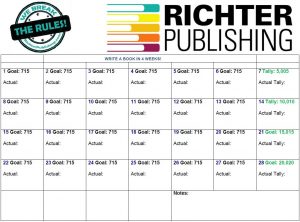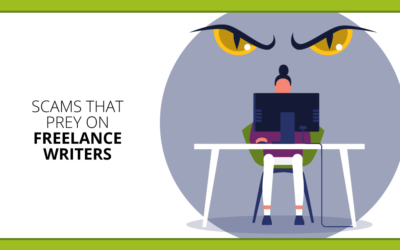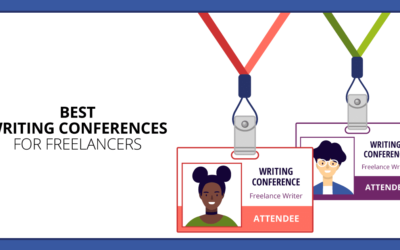Ever thought about self-publishing a book? With all the tools available now, it’s relatively easy to do. It might not be your ticket to fame, but self-publishing can be a great way to help you get more freelance clients and earn more money.
I’ve been a freelance writer since 2007. When I transitioned to ghostwriting in 2014, I quickly learned that I needed a better marketing strategy. The problem with ghostwriting is that you can’t exactly tell anyone what you’ve written. This is especially true when you sign a non-disclosure agreement.
Has a prospect ever asked you for writing samples, but you don’t have anything in your portfolio to show off your skills?
That’s what happened to me. When a potential client would ask if I’d ever written a book, for example, my answer would be, “Yes, but I can’t tell you what I’ve written.”
Not exactly the response to turn a prospect into a client. That’s when I started to think about self-publishing. I decided to write books of my own, under my own name, simply to have something to show to help me find more clients.
Here’s the self-publishing strategy I developed to land more freelance work:
Choose a book topic
Want to stand out in your niche? Self-publish a book on a topic your prospects are interested in. About what? Try not to over complicate this. You can probably think of a ton of potential book ideas in just a few minutes.
Pick a subject you already know a lot about
You’re not trying to write the next great American novel or a New York Times best seller. Of course you’re going to put your best effort into writing your book. But keep in mind this self-publishing strategy is meant to help you land more freelance clients, not make book sales.
I decided that I should write a book about a subject I love…saving money. I knew I would be happy doing more research on this topic and wanted more clients in this niche.
Know your niche
One of the books I self-published for this purpose was 100 Ways to Save Hundreds on Your Wedding. This was a quick and short eBook to help people manage the costs of planning a wedding. Did you know the average cost of a wedding is about $30,000? I spent a total of $5,000 on my wedding, and it was lovely.
Self-publishing this e-book tells prospects in the money-saving niche, as well as the budget-wedding niche, that I’m not blowing smoke when I say I know a lot about these two topics.
Take a minute to think about your current clients and prospects in your niche to help you choose a book topic:
- What topics in your niche do you already know a lot about?
- What type of clients or industries do you currently write for?
- Will your chosen topic help you connect with prospects in your niche?
- If your book idea seems too big, can you narrow it down into a series of books?
Got an idea for a book in your niche that you can self-publish? Great. You’re ready to move on to research and writing.
Self-publishing: Write a book in a month
If you’ve ever thought about self-publishing a book, you’ve probably at least made it through the idea phase. But how do you go from idea to getting the book written…fast? It’s not as hard as you might think.
Create a timeline for research and writing
To get my book written quickly, I used a free 4-Week Writing Calendar by Richter Publishing. It basically helped me set a goal of how many words per day to write in a month to write 20,000 words. Over the course of about six weeks I researched, brainstormed, wrote and edited the book.
Design a book cover
Once I was done writing, I went onto Canva to design a book cover with stock photos I purchased. (Yes, you could pay a graphic designer to create an eye-catching cover. And you should if your primary goal is book sales. In an effort to control costs, I decided to design my own book cover for this self-publishing experiment.)
Publish on Amazon
From there, the rest was pretty easy. I followed all the steps using Kindle Direct Publishing to self-publish the book on Amazon.
If you’ve never published a book on Amazon before, you might think it’s a difficult or challenging process. But it really isn’t. Get your book written. Design a cover. Set it up on Amazon, or another self-publishing platform. And you can add published author to your bio when you reach out to prospects with a query letter or LOI (letter of introduction).
Level up your marketing
I didn’t exactly write my books intending to make money directly off of them. If I make sales, that’s great. However, my main goal for this experiment was to secure consistent freelance clients.
Add published author to your bio
Once my book was published, I promoted it on social media to let clients and prospects know about it. I started mentioning the book in query letters and LOIs. If any clients or prospects asked to see it, I send them a PDF copy.
My results
I self-published a couple more books after the first one, because I could tell it was working. Having a few titles under my belt landed me a few blogging clients, a couple of e-book writing gigs, and one larger print-book client.
Interestingly enough, most prospects don’t even care to read the books I’ve self-published. The simple fact that I can direct them to an actual title with my own name on it is what seals the deal.
This self-publishing strategy helped me land more freelance clients and double my income. And it’s worked well enough that I plan to write more e-books in my niche to keep growing my freelance business. Landing contracts and earning consistent income from freelance work because of my books is pretty sweet.
Use self-publishing to get more clients
If you’re trying to secure paid freelance gigs, write a book about a topic in your niche. Then use it to level up your marketing efforts and stand out among other writers. If nothing else, it’s a great credential to add to your resume, and it feels really good to have a project like this completed.
Here’s the real benefit of this self-publishing strategy: When you reach out to a prospect on a specific subject that you wrote a book on, you can honestly say you have already researched their niche extensively. It’s a great way to get a prospect’s attention and demonstrate your skills as a book author, copywriter, blogger, etc.
What are you waiting for? In four to six weeks, you should be able to self-publish a book in your niche and start using it to land loads of new clients.
Have you self-published a book? Let’s talk about the process on my Facebook page.
Ashley Grant is a freelance ghostwriter based in Tampa, Fla. She’s been freelancing since 2007 and loves being able work anywhere with a Wi-Fi connection.












